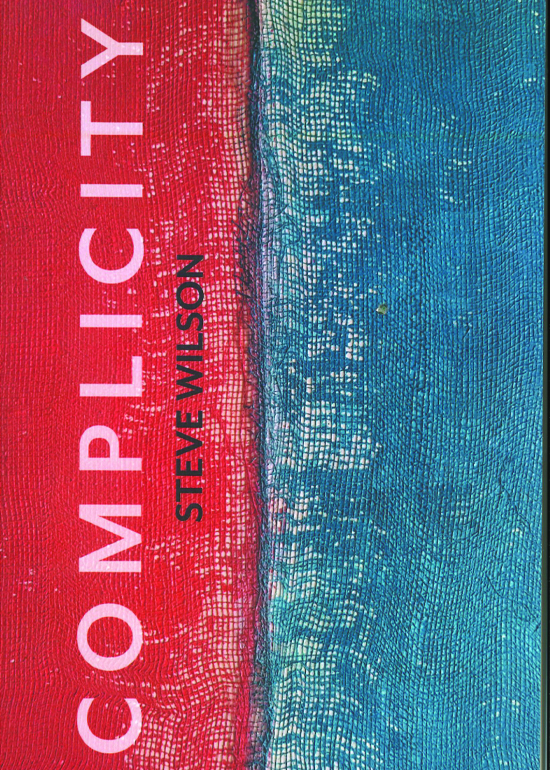Emotional Landscape

Complicity
by Steve Wilson
Georgetown, Kentucky:
Finishing Line Press, 2023.
36 pp. $15.99 Paperback.
Reviewed by
Casey L. Ford
In Steve Wilson’s most recent collection, Complicity, thirty-six poems dance in the dark and create light there. They show the sage versatility of a master, a visionary both in terms of hindsight and of prophecy, who intuits that place where, as poet Donald Revell says, “utterance [enters] time in the elapsing line.” Though the adverbial section headings—because, therefore, thus, regardless, yet—are not indicated in the table of contents, they exist faintly in the header of each page of the poems, understated but critical to a subtle, overarching cause/effect narrative.
In the first section, because, the poems hold to the stillness and bittersweetness of memory, its ironies and illusions. In an “unlocked, profoundly open” doorway, the speaker looks once and sees the past, but looks again and sees it has been revised. Swimming in “The Dead Sea,” the speaker struggles between “the urge to move / outward into something else where I am // aware of myself” and “afloating… / lounging… / in this selfsame body * wrapped up in water.” When read silently or aloud, Wilson’s deep-cut “Prayer Along the Road” makes one tremble with complacency or an inability to act—past, present, and future—in a seemingly futile, insistently violent landscape.
The second and pithiest section, therefore, investigates the subtleties of abandon, or total faith, against recklessness. In “Late July Afternoon Beside Cuskinny Marsh,” Wilson uses sound and light to paint the streaks of “the wide and deepening // wilds beyond / our isolations” that color this collection. Belief in anything, whether it's justice, divinity, or love, is reckless because it is inevitably attacked by uncertainty, bleakness, isolation. But holding faith in an upside-down world of “spaces painted red by violence,” where “bells call from shut schools,” takes decisive surrender to wild curiosity and unknowing.
Thus, the third section, shifts decidedly to loss. This part is filled with sound: sounds of silence, goodbyes, and forgetting, because “Always someone’s leaving for good… / Always someone’s on the way out,” but also the sound of swirling winds and planets, of “Caught Music,” “Rondos, serpentine: the unsung / voiced with xylophones.” But in the fourth section, regardless (and the reviewer is heartily aware these section headings serve multiple purposes in her sentences), nature enters with all its balm and largesse. “We are anticipated everywhere… / at the heart of the canyon, along rockfall”; “we set out glad for the woods, abandon / paths, lean into the wind and let go.” The final section of the collection, yet, contains only one poem, and alone, it conveys one image that holds every important theme in the book: the “ghost-glow / from the streetlights” on silent, settled snow at midnight, a bruised and brutal landscape but not without softness and its own purity, and not without those warm smudges of bright and light.
Complicity seeks out snow-packed divots of helplessness and unforgiveness, thaws them with love, anger, sorrow, confession, and longing, and refills them with hope. So many artists are producing kairotic work like this that deals with the corporate pain of humanity in a world that is changing more rapidly than we can prophesy or process, one that hurts us again before we have had time to heal. Wilson articulates the complex emotional landscape of a shifting American democracy, monolithic capitalism, recast and reignited battles for social justice, and post-pandemic grief and disillusionment—so much mental illness we’re suffering and surviving together and alone. The speaker in these poems investigates complicity from every angle in as many circumstances, and reading them, readers may perceive they have been unanchored. Adrift, they find they can either flail their arms or relax into the irrepressible tide.
Casey L. Ford is director of the writing center at Lamar University in Beaumont, Texas. She also teaches creative writing in the Department of English and Modern Languages, and she is co-editor with Dr. Adam Nemmers of the Review of Texas Books. She recently earned an MFA in creative writing from Fairfield University and her first Pushcart Prize nomination from Last Stanza Poetry Journal. Her poems have appeared in Delta Poetry Review (forthcoming this month), Ocotillo Review, Concho River Review, Texas Poetry Assignment, and Amarillo Bay, among other places.
